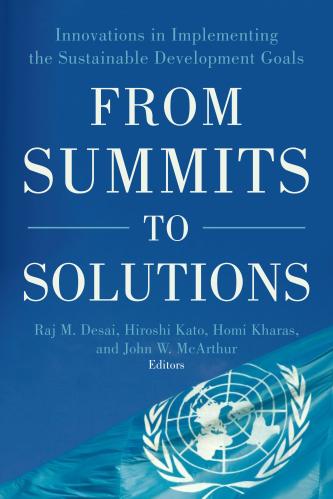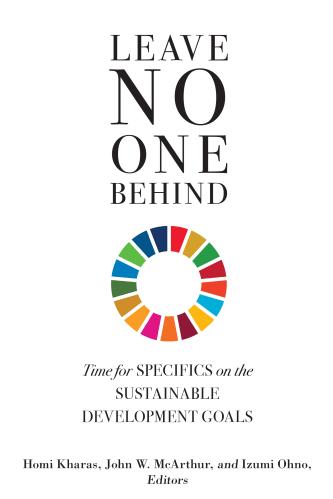This year’s U.N. General Assembly in September was the first time that heads of state and government came together to assess global progress on the Sustainable Development Goals (SDGs) since their adoption in 2015. Four years in, the United States is the only OECD and G-20 country that has not volunteered to report on its SDG progress. Yet American leadership is not absent. Cities, states, universities, philanthropies, corporations, and NGOs have embraced the SDGs to advance social, economic, and environmental progress in communities across the United States, providing a platform for American local and global engagement on sustainable development.
While in New York City, the Brookings Institution and UN Foundation hosted an event to examine these diverse forms of leadership by different segments of American society, exploring their role in advancing progress domestically and worldwide.
Several key takeaways emerged:
1. The SDGs reflect and reinforce America’s values
The SDGs are undoubtedly shaping global norms of sustainable development. They also represent American values and offer a vision that elevates the development principles that have guided America’s own growth and prosperity. These include, for example, an emphasis on equity and opportunity for all; human rights; democratic governance; rule of law; and environmental sustainability. Upholding these norms is good for America and the world.
John R. Allen, President, Brookings Institution
2.The SDGs are a comprehensive and useful framework for U.S. action locally and globally
Among 17 goals and 169 targets, three key concepts are at the heart of the SDGs: ending the indignities of deprivation; producing an inclusive and productive global economy that leaves no one behind; and addressing the existential threat of climate change. Underpinning these concepts is the notion that no one sector of society can solve these challenges alone, and that their imperative is as meaningful to U.S. communities as anywhere in the world. American institutions and communities are proving that the SDGs provide the basis for collaboration and community pride at home, and political leadership abroad.
Raj Shah, President, Rockefeller Foundation
3. The SDGs should be a core part of strategies and plans for businesses, philanthropy, and other institutions
The change and ambition called for by the SDGs will not be achieved by tinkering around the edges or seeing them as a philanthropic exercise. Reaching the SDGs requires a mindset shift that enables companies, local governments, philanthropies, and other institutions to incorporate the goals into their core business practices and strategies. Doing so offers a blueprint for gaining a comparative advantage over the long term. The relevance of the SDGs to corporate operations reflects the widening mandate of business to measure their value to stakeholders, not just shareholders.
Hans Vestberg, CEO, Verizon Communications
4. American cities are leaders in addressing global issues through local action
As the UN Secretary-General laid out in his remarks at the SDG Summit, “We need to step up domestic responses to make a difference where it matters—in people’s lives.” American mayors and other local leaders, along with their global counterparts, form the frontlines of SDG implementation, acting entrepreneurially and independently to translate the agenda’s aspirations into solutions for real people living in real communities. This is reflected in Los Angeles Mayor Eric Garcetti’s commitment to end homelessness in 10 years and in Pittsburgh’s insistence on measuring and improving social equity. A joint commitment to the SDGs can facilitate a spirit of collaboration at the local level among government, business, and civil society. Collectively, this action by cities translates into overall global progress.
William Peduto, Mayor, City of Pittsburgh
5. The SDGs are providing American universities with the basis for addressing societal challenges and growing the next generation of social leaders
American universities have a long history of applying their intellectual capital to improve their communities and address the world’s toughest challenges. Building on the momentum to achieve environmental sustainability in their operations, universities are recognizing the SDGs as blueprint for how their pedagogy, research, and student engagement can stimulate progress along all the dimensions of sustainable development – and support the development of a cohort of new leaders to guide the way.
James Garrett, Provost, Carnegie Mellon University
David Finegold, President, Chatham University
6. American innovations are inspiring global action
Last year New Year City presented the first review to the U.N. of a city’s contributions to the SDGs. This has spawned a global movement, with almost 30 cities worldwide now committed to completing their own Voluntary Local Reviews. At the event, Carnegie Mellon University announced its commitment to undertake a first-of-its-kind Voluntary University Review, and Hawaii is undertaking a first-ever statewide review. Hawaii is also helping to create and lead a network of global counterparts to apply an island worldview to achieving sustainable development and success on the SDGs.
Celeste Connors, CEO, Hawaii Green Growth
Penny Abeywardena, Commissioner of International Affairs, New York City
As the SDG Summit indicated, the world has quite a bit of catching up to do to put us on course to reach the global goals. As we move into 2020 for the final 10 years of the SDGs—what Secretary-General Guterres has named a “decade of delivery”—it will be even more critical to support, encourage, and grow diverse forms of American leadership.
The Brookings Institution is committed to quality, independence, and impact.
We are supported by a diverse array of funders. In line with our values and policies, each Brookings publication represents the sole views of its author(s).






Commentary
American leadership on the Sustainable Development Goals
October 14, 2019